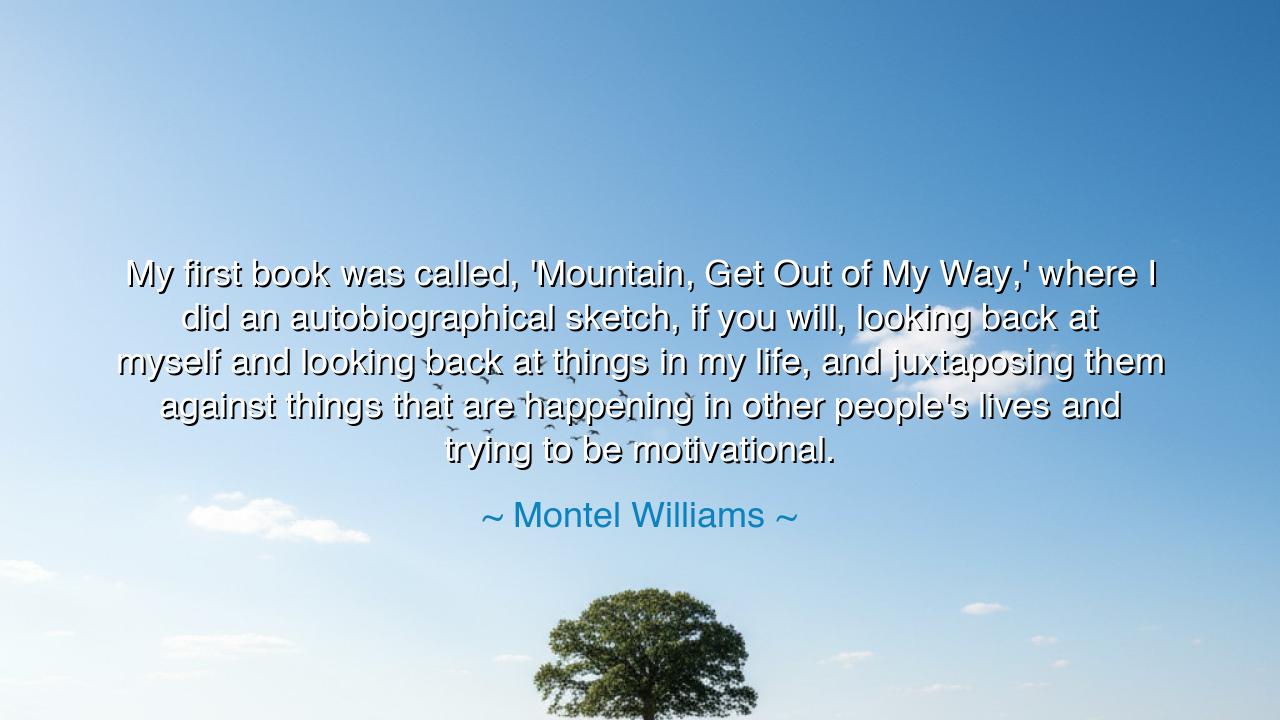
My first book was called, 'Mountain, Get Out of My Way,' where I
My first book was called, 'Mountain, Get Out of My Way,' where I did an autobiographical sketch, if you will, looking back at myself and looking back at things in my life, and juxtaposing them against things that are happening in other people's lives and trying to be motivational.






In the words of Montel Williams, a man who has walked through hardship and victory alike, we are given a proclamation of resilience: “My first book was called, ‘Mountain, Get Out of My Way,’ where I did an autobiographical sketch, if you will, looking back at myself and looking back at things in my life, and juxtaposing them against things that are happening in other people's lives and trying to be motivational.” This statement is no casual recollection—it is the unveiling of a philosophy of endurance. For the mountain is the eternal symbol of obstacles, those immense forces that block the path of human will. To say “Get out of my way” is not to deny the mountain’s size, but to declare that the spirit is greater still.
The origin of this declaration lies in Williams’s own life. As a soldier, television host, and man who faced serious illness, he encountered struggles that might have crushed others. Yet rather than hiding his story, he laid it bare in writing, not for self-glory, but to create a mirror for others. By comparing his own battles with the struggles of many, he revealed a universal law: all men and women have mountains before them, but each mountain can be moved—if not in stone, then in spirit. His book was not merely an autobiography, but a call to rise, to endure, and to overcome.
The ancients themselves spoke of mountains as symbols of challenge and destiny. Consider Hannibal of Carthage, who faced the impossible barrier of the Alps when marching his army to Rome. Snow, rock, and steep cliffs stood in his way, yet with determination, ingenuity, and courage, he crossed what others thought uncrossable. His feat was not just military genius, but a testament to human will against nature’s might. Like Williams, Hannibal’s story shows us that mountains yield to those who refuse to bow before them.
Even in scripture and myth, the mountain has been the place of trial. Moses climbed Sinai to receive the law, facing the weight of divine fire. Buddha meditated beneath the Bodhi tree in the shadow of the Himalayas, confronting inner mountains of doubt. The mountain is ever both the obstacle and the place of revelation. Williams’s command—“Get out of my way”—is thus not arrogance, but a cry of courage, a refusal to let adversity dictate the course of his life. It is the same cry that has driven prophets, warriors, and seekers throughout the ages.
The meaning of his words is this: no life is free of trials, but the way we face them determines our legacy. Some see the mountain and surrender, saying, “It is too high.” Others, like Williams, look upon it and declare, “You will not hold me.” By sharing his story, he became not merely a survivor of his own struggles, but a guide for others facing theirs. To be motivational, in the truest sense, is to transform personal suffering into shared strength, to show others that they too may command their mountains to move.
The lesson for us is clear: identify your mountains. Name the obstacles—fear, illness, failure, grief—that stand before you. Do not pretend they are small, but neither believe they are unconquerable. Tell them, as Williams did: “Get out of my way.” Take action step by step, climb when you must, go around when you can, and if needed, break the rock with persistence. For the mountain is never greater than the will of one who refuses to give up.
Practical counsel is this: write down your greatest challenges as if they were mountains before you. Then, as Williams did, compare them not only with your past victories but with the struggles of others, to remember that you are not alone in the climb. Each day, take one deliberate step toward pushing that mountain back, whether through discipline, courage, or faith. Over time, the mountain will not vanish, but you will rise above it, and your story will become the torch that lights the path for others.
Thus, Montel Williams’s words endure as both a confession and a command: “Mountain, Get Out of My Way.” They teach us that the obstacles of life, though vast, are not final. They remind us that even in sharing our own pain, we give strength to others. And they leave us with this eternal charge: do not bow before the mountains of life—stand, speak, and move forward, until the path that seemed impossible is made clear beneath your feet.






AAdministratorAdministrator
Welcome, honored guests. Please leave a comment, we will respond soon